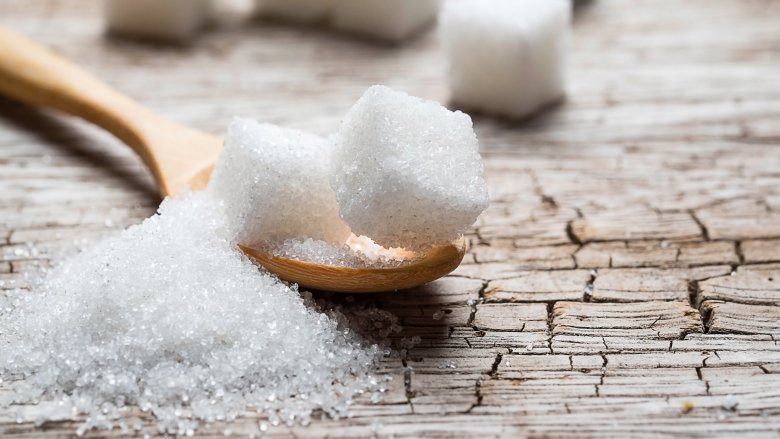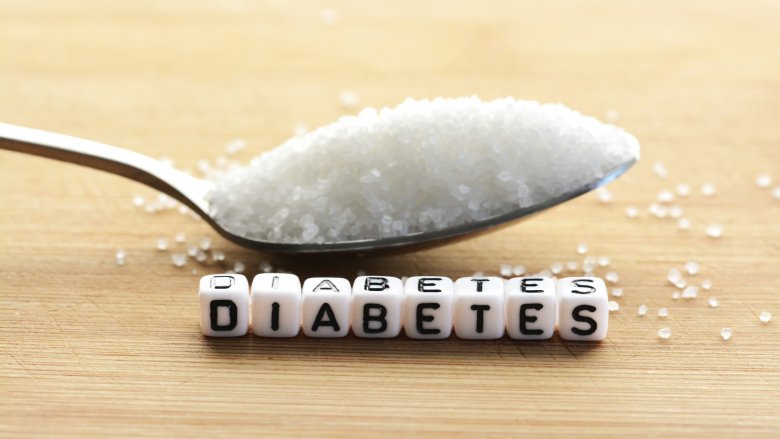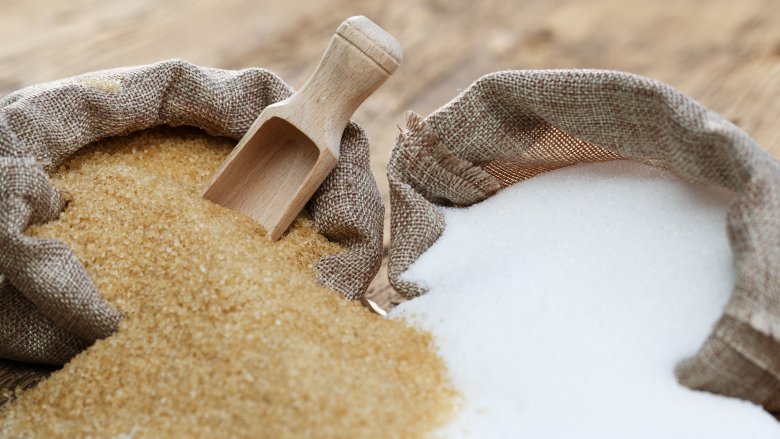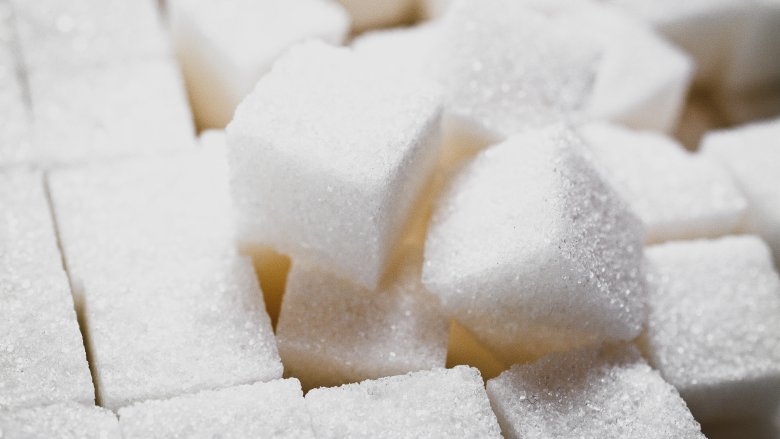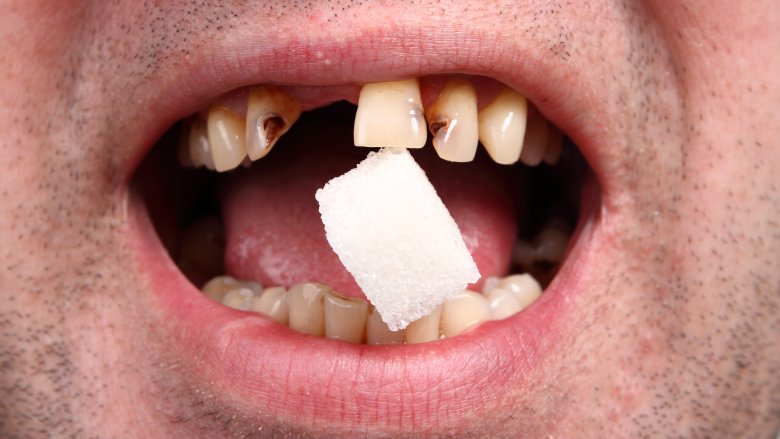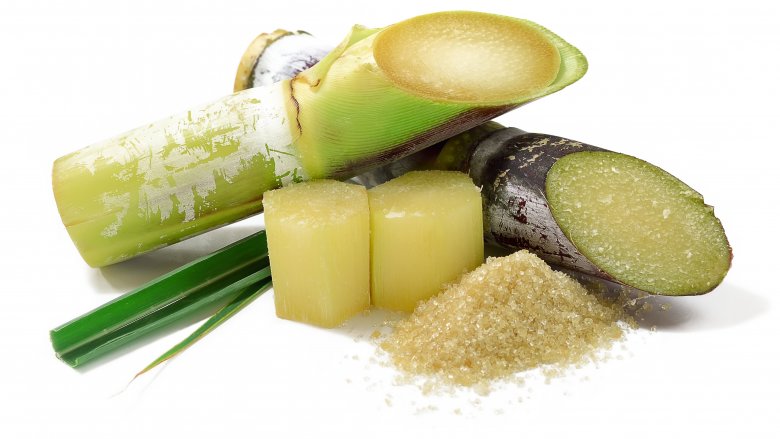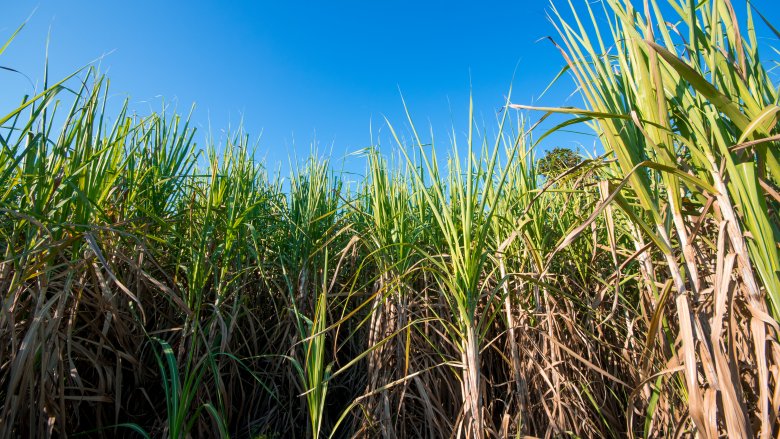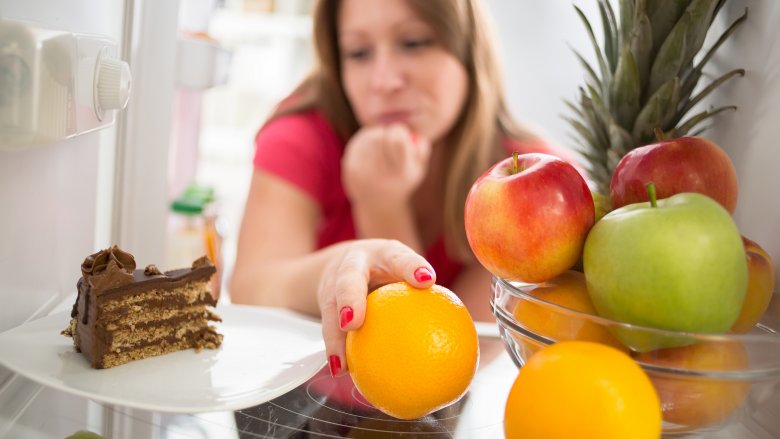False Facts About Sugar You Always Thought Were True
Sugar tastes great, it gives you energy, and it's probably in more things you eat than you realize. And although most people will agree with these facts about sugar, dig any deeper into the cultural and dietary elephant the sweet stuff has become, and you might find the truth a little harder to come by. So to make your life a little simpler, here are some false facts about sugar you always thought were true.
Sugar causes diabetes
Although people with diabetes struggle to control their blood sugar level, that's a symptom of the disease, not the cause. Type 1 diabetes is caused by the immune system attacking the insulin-producing cells in the pancreas — it has nothing to do with sugar consumption.
The causes of type 2 diabetes are a combination of genetics and lifestyle. Some people inherit from their parents certain genetic mutations that put them at greater risk of developing diabetes — this doesn't mean it's inevitable, just more likely. However if they are also overweight, get little exercise, and make poor dietary choices, their risk of developing insulin resistance increases significantly. Eating too much sugar will definitely contribute to someone's weight issues, but so will eating too much bacon and pizza, and sitting on the couch instead of taking a walk. Type 2 diabetes has many contributing factors, and although sugar was at the party that burned the house down, it was probably just a face in the crowd.
Sugar causes hyperactivity
It's a trope so old even the Simpsons have used it: eating lots of sugar will make kids go nuts... or hyperactive if you prefer the official term. And it kinda makes sense: eating sugar gives you energy, therefore lots of sugar must give you lots of energy. But according to studies, that's simply not the case. Just because things happen at the same time, doesn't mean one thing causes the other, and that's exactly what's going on here.
On Halloween kids get dressed up, run around after bedtime getting loads of free candy, and then eat it and start bouncing off the walls. But off all those things the only ones that might actually make them hyperactive is the excitement. That's because as it turns out, most kids don't behave any different whether they have been eating sugar or something else. Plus, if you tell kids eating sugar will make them hyperactive, the kids will be more likely to act that way, because how we behave is strongly affected by how we are expected to behave.
Brown sugar is healthier than white sugar
When it comes to navigating your way to a healthy diet, the general rule that brown food is better than white food is a hard one to knock. And so it's understandable that people might extend that rule of thumb to sugar—but that would be a mistake. Brown sugar might look like it's been spared the processing of white, but the truth is most brown sugar has gone through the exact same experiences as white, but then had some of the natural molasses that were originally removed during processing, added back in. It's done this way because it is easier to control quality and consistency. And although molasses does have some trace minerals, there aren't enough to claim any health advantages. In fact brown sugar has more calories than white sugar, weight for weight, meaning at least on that metric, it's actually worse for you. Not quite the answer you were looking for.
Sugar makes cancer grow faster
There is a school of thought that thinks that since all cells, including cancer cells, consume sugar for energy, that giving cancer more sugar will only help it grow faster. According to the Mayo Clinic, denying cancer cells sugar, or giving them extra, won't have any effect on their growth rate. There is some evidence that eating large amounts of sugar might make you more likely to develop certain types of cancer, but it doesn't make existing cancer grow more quickly.
Sugar causes cavities
Sugar doesn't rot your teeth (no matter how many times people tell you), acid rots your teeth. Admittedly that acid is produced by bacteria that feeds on sugar, but since it also feeds on carbohydrates left behind by any number of other foods, including grains and fruit, it's a bit harsh to place all the blame on sugar. The real culprit to watch out for, if you want to avoid cavities, is dental plaque. This starts to grow on your teeth when the acid from the bacteria combines with saliva. And if you don't take steps to remove it frequently, will have your teeth going soft in no-time. Another important thing to know about the bacteria in your mouth is that the acid it produces only sticks around for around 30 minutes after eating. So if you plan on eating chocolate, or fruit, or any other bacteria feeding carbs, it doesn't matter if you plan to eat a pound, or just a couple of ounces, if you eat it all in one go it makes no difference to your teeth. Stretch your snack out over the whole day however, and you are exposing your gnashers to an acid bath for 30 minutes every single time you take a nibble. Of course you don't even need to eat anything to give your teeth an acid bath, because you can skip the carbs, bacteria, and plaque, and just drink some diet soda instead. Because it has all the acid your dentist's wallet will even need.
Natural sugar is better than processed sugar
Whether you're eating an apple, putting honey in your tea, or simply dumping a spoon of white sugar in your jug of gas station coffee, you are in every case adding the same two basic ingredients to your diet: fructose and glucose. They might come wrapped in different packaging, but when you get right down to it one is pretty much like another, and concepts like "natural" and "refined" have very little relevance. Fruit does come with extra fiber, and contains less sugar by weight than plain sugar or honey, but the sugar it does contain is pretty much indistinguishable from the white stuff on your kitchen table, and it's not like you're going to use an apple to sweeten your wake up juice anyway.
Sugar is vegetarian
Sugar comes from either sugar cane or sugar beets, and since they're both plants it would be easy to assume that sugar is pretty safe for vegans, right? Umm...no. Actually depending on which plant your sugar comes from, it might not even be safe for vegetarians.
If your sugar comes from beets, the juice is processed through a diffuser, then mixed with additives to create the familiar white sugar crystals. Sugar cane on the other hand requires a little more work. Sugar cane is first crushed to release the juice, which is then heated to create the crystals, but unlike sugar from beets, cane sugar must then be filtered to get it all the way white, and most of the time that filtering is done with bone char. Bone char is created by heating animal bones until they are reduced down to carbon, which makes for good filtration, but bad for cows whose bones are most commonly used. Not all sugar from sugar cane is made using animal bones, but you can't tell which is which just by looking at the container. And if you're a vegetarian or vegan and you order food that contains sugar, you have no idea whether it came from beets or cane, making any sweet treat you might order an ethical crap shoot.
Sugar is addictive
Studies in rats have shown that areas of the brain associated with pleasure light up more strongly when the rats are given Oreos, than when they are given cocaine. Another study looking at people with so-called food addiction found that their brains react in the same way to the prospect of eating, as drug users' brains do in anticipation of taking drugs. But as we pointed out previously, correlation does not necessarily mean causation—and scientists agree.
People might crave sugar, and choose it over healthier options, but that doesn't mean they're addicted. There are many facets to addiction: constant obsession, loss of control, escalating use, and withdrawal symptoms when cut off. But out of the many people (i.e. all the people) in this country that enjoy sugar, very few display more than a couple of those traits.
Alongside food there's another thing humans are programmed to enjoy, and that's sex. Take a survey of any group of teenage boys, and you won't be surprised to find a powerful enthusiasm for sex, but few people would claim they were addicted. Many things are pleasurable, and plenty of those can be addictive, but if just thinking about something constantly, and getting a strong pleasure response when it finally comes, equals addiction, then there are more than a few Game of Thrones fans who probably need to check into a clinic.
